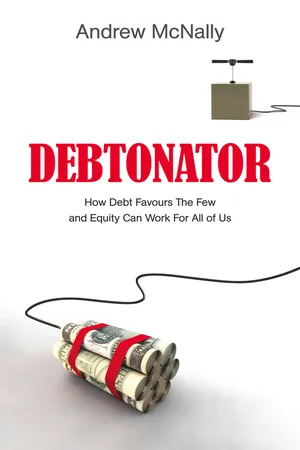
- English
- ePUB (mobile friendly)
- Available on iOS & Android
About this book
A powerful argument that transcends left vs. right to address one of the most pressing problems of our era
We are all swamped in debt. Households, corporations, governments—debt has become so ingrained in our culture, it is an unquestioned fact of life. But it has not always been this way. And there is increasing evidence that this model is damaging both business and society. Debt leaves control and ownership in the hands of too few: it is a direct source of extreme inequality. However, there is another way of bankrolling our economic future: equity. This book argues that, by broadening direct ownership of assets through equity, we can make everyone better off—not just the few. There is value in equity way beyond what financiers, economists, investment bankers, and many corporate CEOs will tell you. It is the value of aligned interests, of trust and fairness, of optimism and patience, of stability and simplicity, of shared endeavor. Only when we unleash this value will economic democracy secure the political democracy that we cherish.
Frequently asked questions
- Essential is ideal for learners and professionals who enjoy exploring a wide range of subjects. Access the Essential Library with 800,000+ trusted titles and best-sellers across business, personal growth, and the humanities. Includes unlimited reading time and Standard Read Aloud voice.
- Complete: Perfect for advanced learners and researchers needing full, unrestricted access. Unlock 1.4M+ books across hundreds of subjects, including academic and specialized titles. The Complete Plan also includes advanced features like Premium Read Aloud and Research Assistant.
Please note we cannot support devices running on iOS 13 and Android 7 or earlier. Learn more about using the app.
Information
Table of contents
- Cover
- Title
- Contents
- Introduction
- 1. Debt and Equity 101
- 2. The Real Value of Equity Finance
- 3. Nobel Finance
- 4. The Rise and Rise of Debt
- 5. How Debt Favours the Few
- 6. The Social Value of Equity
- 7. A Sense of Urgency
- 8. Beyond the Debt Bias
- Conclusion
- Notes
- Bibliography
- Index
- Copyright